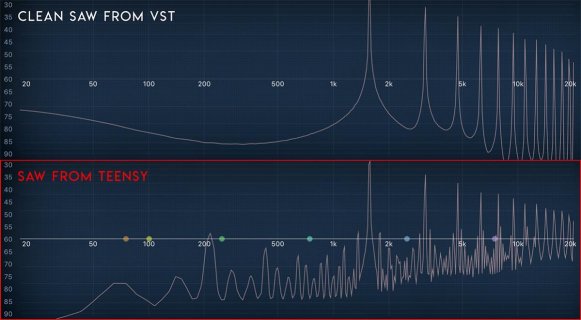ohoomens
Member
Hey there!
First of all: Thanks Paul for this wicked platform. It opens up the world of electronics and being creative with it even for programming-noobs like me (I'm starting to get somewhere but I'm by no means a pro!).
So I'm currently working on my bachelor thesis and I've been building a touch based synthesizer based on the Teensy for about a year now. It's starting to look cool and I've got a lot working already, but currently I'm struggeling with audible aliasing effects (I think it's aliasing at least) on the waveform synthesis, especially on higher frequencies from 800hz upwards - nyquist is probably the limiting factor here? With a sine wave it's obviously not really noticable but with triangle, sawtooth and every other waveform which has high frequency components there are loads of audible artifacts. There seem to be a few other threads about this but I could not find a solution so I thought I put this up again. As far as I could identify the problem: I need to limit the bandwidth before the synthesis happens.
For all of you pros out there: How can I limit the waveform bandwith so nyquist won't destroy my beautiful sound waves?
Thanks in advance!
First of all: Thanks Paul for this wicked platform. It opens up the world of electronics and being creative with it even for programming-noobs like me (I'm starting to get somewhere but I'm by no means a pro!).
So I'm currently working on my bachelor thesis and I've been building a touch based synthesizer based on the Teensy for about a year now. It's starting to look cool and I've got a lot working already, but currently I'm struggeling with audible aliasing effects (I think it's aliasing at least) on the waveform synthesis, especially on higher frequencies from 800hz upwards - nyquist is probably the limiting factor here? With a sine wave it's obviously not really noticable but with triangle, sawtooth and every other waveform which has high frequency components there are loads of audible artifacts. There seem to be a few other threads about this but I could not find a solution so I thought I put this up again. As far as I could identify the problem: I need to limit the bandwidth before the synthesis happens.
For all of you pros out there: How can I limit the waveform bandwith so nyquist won't destroy my beautiful sound waves?
Thanks in advance!


